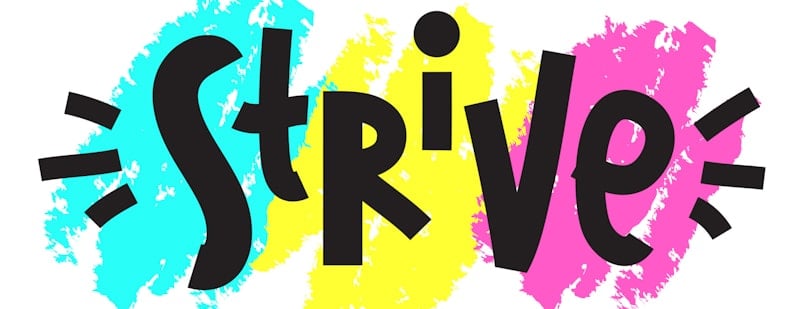For words to take on varied meanings and connotations throughout their use is not uncommon. And if the concerned term has spelling or pronunciation similar to another word, it’s likelier to assume newer or slightly altered connotations. Words that look and read-alike, such as “strive and “strife”, have always managed to trick and confuse writers.
The term “strive” means “putting in effort and energy to achieve a goal”. “Striving” is marked by “persistence”. “Strife”, on the other hand, denotes “battle”, “trouble”, “disagreement” of any kind. “Striving” is internal. “Strife”, however, denotes “conflicts” that are usually for everybody to see.
If the meanings of the two words seem similar, you’re not wrong. However, there certainly is a clear difference between the two, which you’ll learn about in greater detail in this article. Keep reading to learn more.

“Strive” – Definition
The term “strive” signifies devoting “serious energy or effort” to a particular thing or cause. People “strive” for something they do not already have or aspire to have. In modern vernacular, “striving” means “working through adversity or overcoming obstacles” to get better at something or to move on a path towards a goal.
Related terms or synonyms for “strive” include “attempt”, “endeavor”, and “try”. However, “strive” implies a certain level of exertion against great difficulties and signifies determined effort. Its synonyms may not indicate that.
For example, “attempt” stresses on “experimentation” and “effort” to test or prove something, but it doesn’t indicate “doggedness” that’s suggestive of “strive”. “Endeavor” is a level above “trying” or “attempting” in the exertion and difficulty department, but it’s still not up there with “strive”.
“Strife” – Definition
“Strife” denotes “the state or act of arguing violently or fighting”. In simpler terms, “strife” is “discord” or “trouble” of any kind. For instance, “strife” could mean “strong disagreement”. Also, “strife” directly denotes a fight that could be either intramural or external. However, the term is typically used to indicate conflicts that are for everybody to witness.
The violent or furious disagreement that “strife” denotes usually takes place between multiple groups of people, causing the concerned or the people involved a significant amount of suffering and anguish. With a violent “strife”, like a war or a derailed protest, the use of arms and ammunition is quite likely.
In short, “strife” could mean anything from “misunderstanding between two individuals”, “infighting in an office” to “tension between two countries” and “actual violence on the streets of a city”. A cold war between two individuals or regions is a form of “strife”.
Alternate or related terms for the word include “conflict”, “discord“, “disharmony”, “disaccord”, “dissidence”, and “dissonance”.
Comparing “Strive” and “Strife”
Both the terms are believed to have their roots in “estriver”, a French word that simply means “to dispute or quarrel”, and the Old Norse term “stritha” that meant “to fight”. Despite sharing the same roots, the words evolved to assume different meanings and undertones (substantiating the point made earlier in the intro paragraph).
The term “strive” has a positive connotation, and “strife” has a negative tone. As mentioned above, “strife” is primarily an external conflict. “Strive”, however, is an internal struggle.
Also, as both terms are “ancient” in their own rights or have primeval roots, their meanings could have changed slightly or entirely over the years.
For instance, “strife” once meant “strong endeavor”, a meaning that is now considered obsolete and wrong. The archaic meaning has a positive connotation, which is quite clearly not characteristic of what “strife” means currently.
“Strife” also used to mean “strenuous effort”, which is identical in meaning to “strive”, explaining why the two terms are similar to each other and also confusing for many writers. Not to mention, the identical definition validates that the two terms have the same origin or root word(s).
Difference Between Strive and Struggle
The terms “strive” and “struggle” are quite similar in their meanings and are, in fact, synonyms of each other. However, there is a minor difference in what they imply, which justifies their existence as two individual words.
“Strive” has the added meaning that denotes “working hard towards an objective”. For example:
- Tony strived to fulfill his dream of entering one of the Ivy League schools.
On the other hand, a “struggle” has no “target” or “goal” to achieve. “Striving” does entail a “struggle”, but not all “struggle” is “striving”.
“Struggling” is essentially “going through a tough phase” or “putting in the effort to get out of an unfavorable circumstance”. When the difficult period is over, the struggle ceases to exist as well. And, at the end, there’s usually nothing to show as a reward or prize for the pain endured.
While emerging relatively unfazed from a struggle might seem like an achievement by itself, living a life free of economic troubles and misery is not necessarily a “target” to achieve. It’s how life should typically be.
Going back to the above example, Tony may have “struggled” or studied harder to fare well in topics that are supposedly his “weak links”. But he quite clearly did not “strive” to score well in math and the other subjects that aren’t his strength. Using “strive” instead of “struggle” may seem or read correct, but it’s still not accurate or the ideal term to use.
These two sentences below should further make clear the difference between “strive” and “struggle”:
- Everybody needs money, but it shouldn’t be the only thing to strive for.
- When my dad died, the sole breadwinner of the family, me and my mom had to struggle to make our ends meet.
Long story short, people “struggle” due to their circumstances. “Striving” is something they bring on to themselves, in the pursuit of a goal that affords them great happiness.
Using the Word “Strive” in Texts
The term “strive” is primarily a verb. It cannot be changed into an adjective, noun, adverb, or any other type of word. For example:
- We should all strive to get better.
- He has always strived for perfection.
- We shall strive to win.
The verb, however, has inflections, or its tense, for instance, can change. For example:
- She was striving to finish the projects on time.
- He strived to make his boss happy.
Since “strive” is used only as a verb, it’s improbable to use the term in place of a word that’s not a verb.

Using the Term “Strife” in Writings
The noun “strife” is usually used to associate large-scale events and issues, such as a religious conflict or a war. For example:
- The fortress-like structures signify the factional strife among the social classes, political classes, and prominent families.
- His role in the recent civil strife in the city is not clear yet.
Despite being used to denote events bigger in terms of their scale, the word can also be used in relation with or to describe arguments or conflicts between friends, spouses, etc. For example:
- Once her marital strife lessened, she fell more in love with her husband than before.
- To prevent family strife, the kids spend time equally with their two grandmothers during the holidays.
Also, strife is an uncountable noun, or it’s both a singular and plural term. In other words, there’s no such word as “strifes”.
Example Sentences with the Term “Strive”
Besides the sentences above, here a few more example sentences incorporating the term “strive”:
- She strived the entire year to get into the team.
- Strive to make each day meaningful and joyful.
- The fundraisers were striving to hit their monetary goal within the stipulated time.
- Despite being an exceptional athlete, she strived continually to become even better at her game.
- She always strived to make her manager proud.
- Keep striving each day to achieve your ultimate goal.
- The region should now strive to develop economically.
- Most newspapers strive to be the first to break a story.
- We should strive for good health and increased longevity.
Example Sentences with the Word “Strife”
As mentioned above, “strife” could also be used in “familial” or “interpersonal” contexts. The following are sentences representing a mix of both domestic and larger, organization- or region-level strife.
- The pre-war period was characterized by major strife between the southern and northern regions over how the federal government was dealing with slavery.
- It was a phase of civil strife.
- The strife that ensued lasted for more than a century.
- Despite the strife and chaos, she understood the significance of seeking the divine and beautiful.
- Finances can be the primary reason for strife in a lot of marriages.
- The boardroom strife is not over yet.
- There were zero signs of strife in the marriage and no history of erratic behavior or violence.
- The country remains highly strife-torn and unstable.
- The party approached the election hobbled by the strife within its inner circles.
- Despite the internal strife, the family functions like one big cohesive unit.
- Most of the strife stemmed from the friction between the men’s girlfriends and wives.
- Any pay cuts will surely ignite internal strife.
- The company has successfully weathered the industrial strife and employee strikes.
Conclusion

Compared to “strive”, “strife” is slightly less common a word. Most people who know what “strive” means could have zero clues about “strife”. However, that doesn’t take anything away from both terms having the same roots, despite their deviant paths.
To not confuse between the two, remember their meanings and spellings. If their spellings confuse, which is quite likely, note that “strive” is a verb and “strife” is a noun. If you are not sure the word to use is “strive” or “strife”, look at the word type requirement.
If it’s a verb, it’s “strive”; and “strife” if the required term is a noun. If the word needed to complete the sentence is an adjective, adverb, etc., it’s neither of the two.
Shawn Manaher is the founder and CEO of The Content Authority. He’s one part content manager, one part writing ninja organizer, and two parts leader of top content creators. You don’t even want to know what he calls pancakes.

